Importance of Interpersonal Skills in International Business
VerifiedAdded on 2023/01/23
|12
|2269
|86
AI Summary
This report discusses the significance of interpersonal skills in international business and focuses on three key aspects: listening, feedback, and questioning. It explores how these skills can enhance business operations and improve relationships with clients. The report also highlights the challenges of incorporating interpersonal skills in international business and provides recommendations for their effective implementation.
Contribute Materials
Your contribution can guide someone’s learning journey. Share your
documents today.
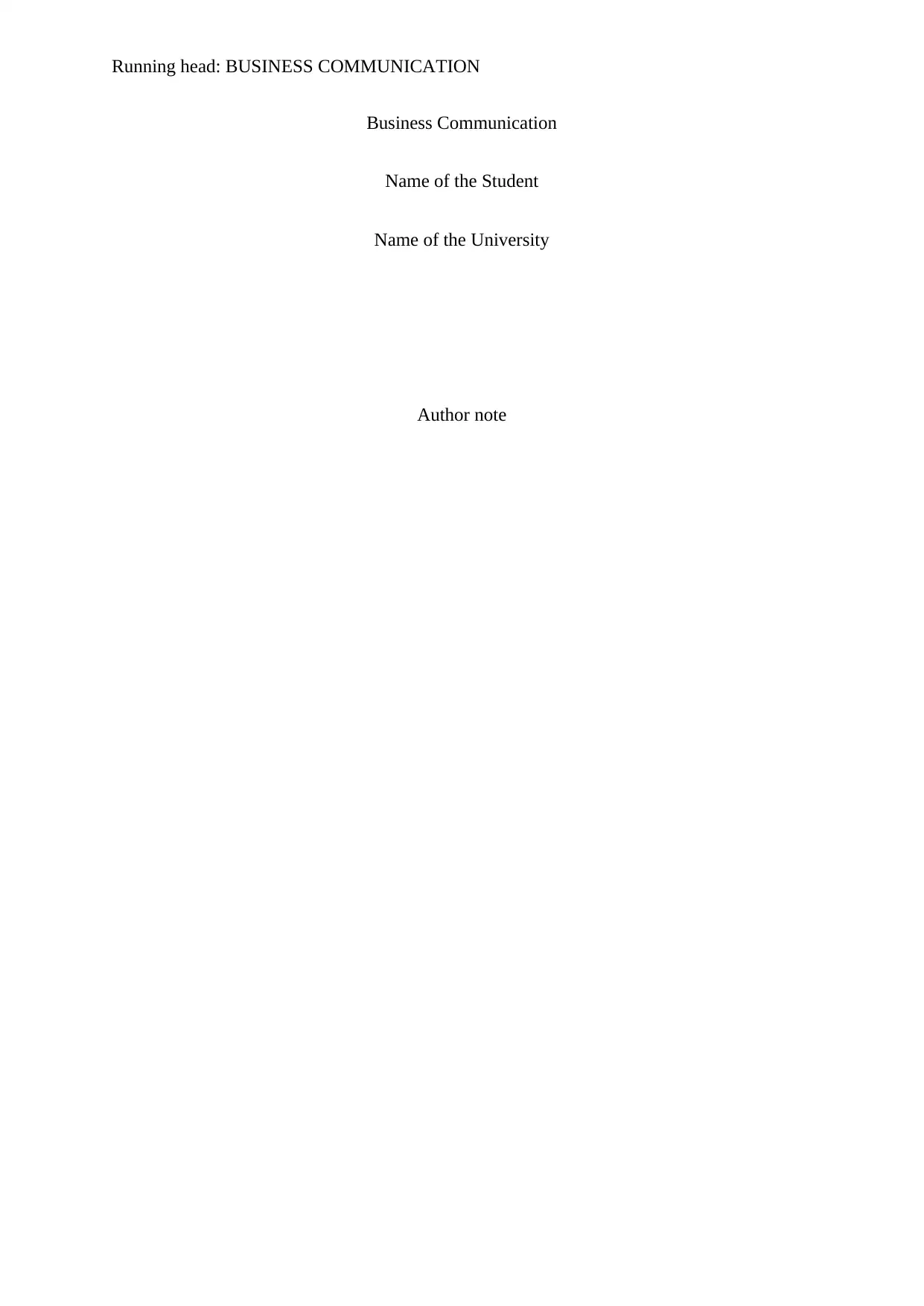
Running head: BUSINESS COMMUNICATION
Business Communication
Name of the Student
Name of the University
Author note
Business Communication
Name of the Student
Name of the University
Author note
Secure Best Marks with AI Grader
Need help grading? Try our AI Grader for instant feedback on your assignments.
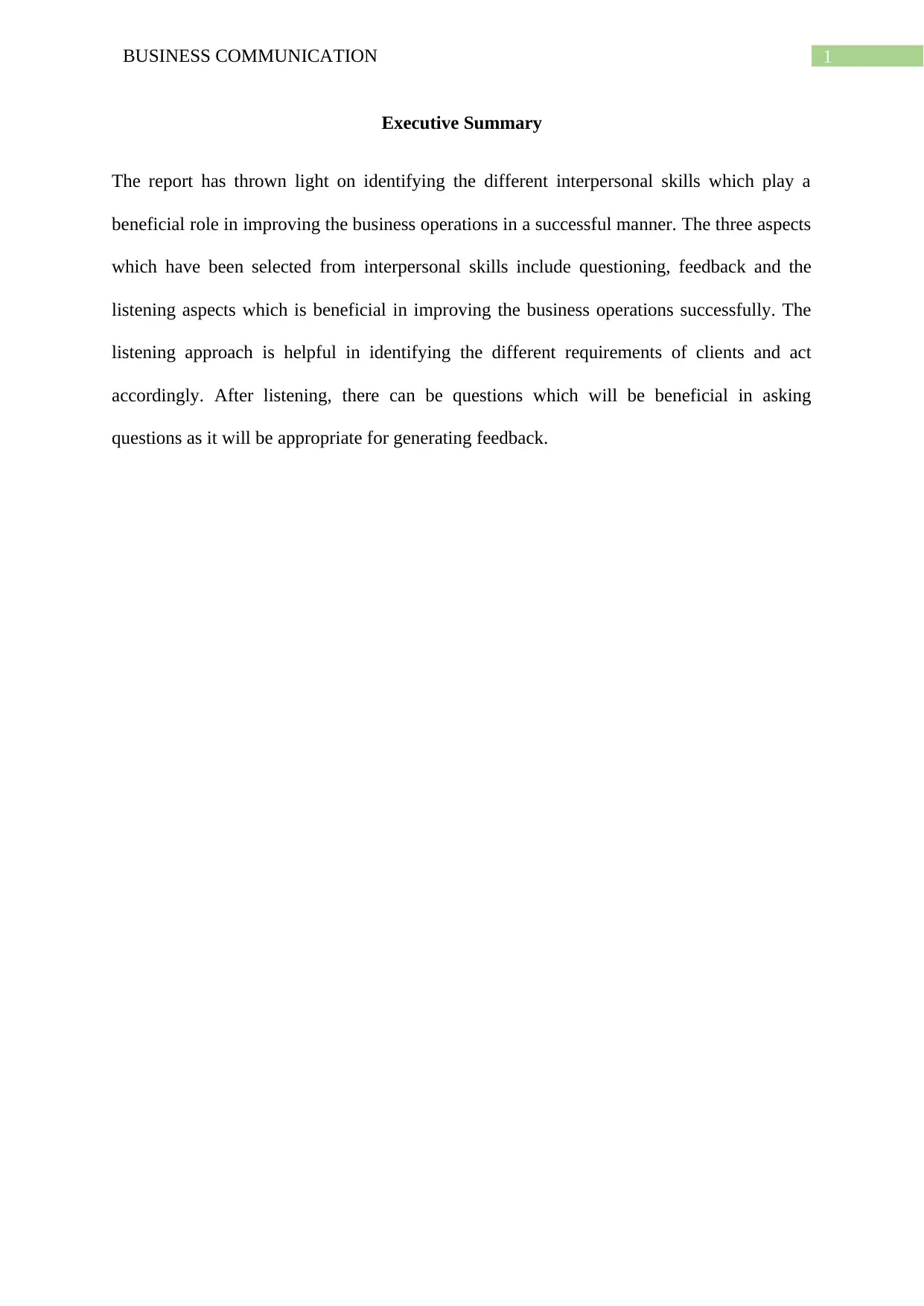
1BUSINESS COMMUNICATION
Executive Summary
The report has thrown light on identifying the different interpersonal skills which play a
beneficial role in improving the business operations in a successful manner. The three aspects
which have been selected from interpersonal skills include questioning, feedback and the
listening aspects which is beneficial in improving the business operations successfully. The
listening approach is helpful in identifying the different requirements of clients and act
accordingly. After listening, there can be questions which will be beneficial in asking
questions as it will be appropriate for generating feedback.
Executive Summary
The report has thrown light on identifying the different interpersonal skills which play a
beneficial role in improving the business operations in a successful manner. The three aspects
which have been selected from interpersonal skills include questioning, feedback and the
listening aspects which is beneficial in improving the business operations successfully. The
listening approach is helpful in identifying the different requirements of clients and act
accordingly. After listening, there can be questions which will be beneficial in asking
questions as it will be appropriate for generating feedback.
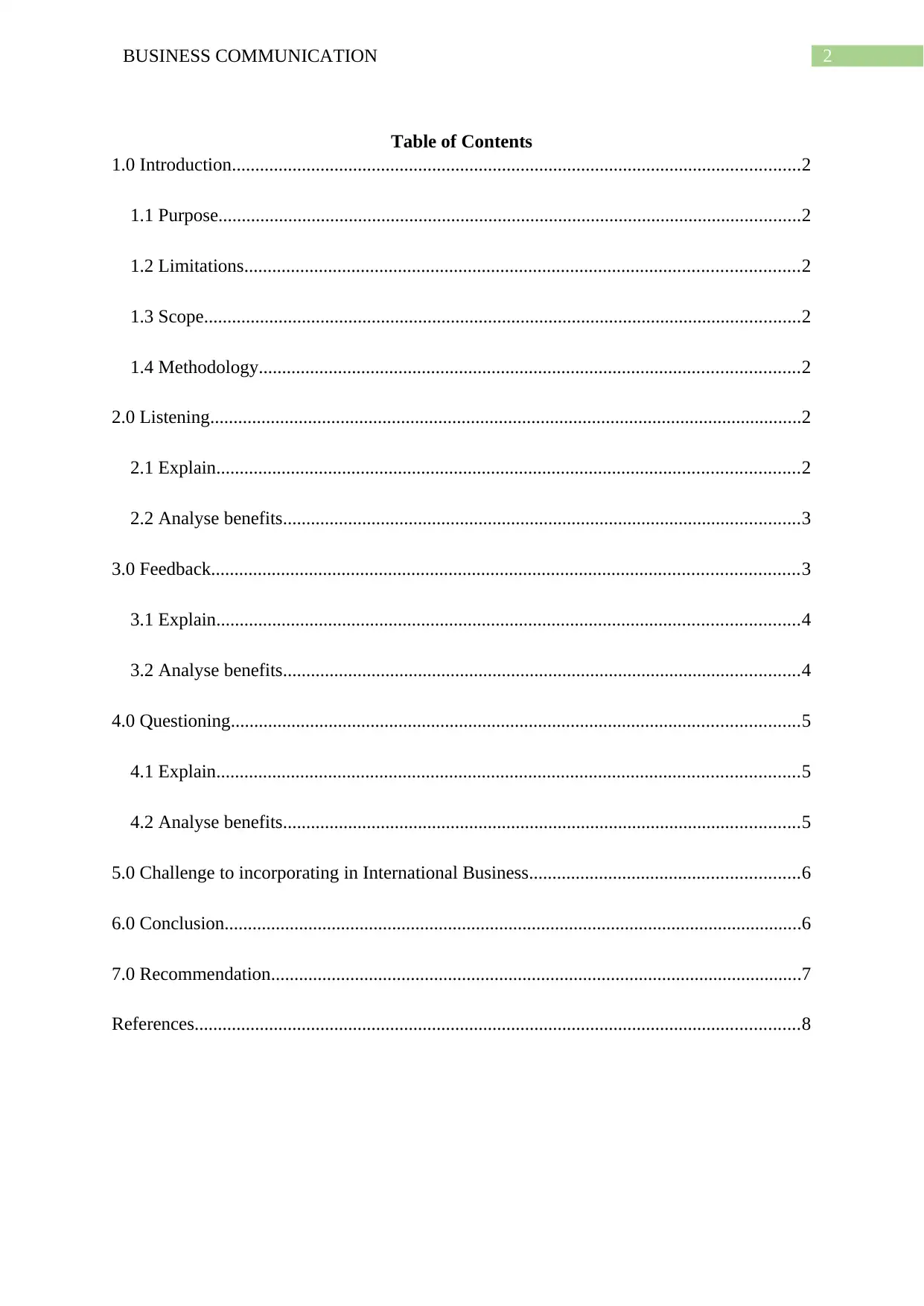
2BUSINESS COMMUNICATION
Table of Contents
1.0 Introduction..........................................................................................................................2
1.1 Purpose.............................................................................................................................2
1.2 Limitations.......................................................................................................................2
1.3 Scope................................................................................................................................2
1.4 Methodology....................................................................................................................2
2.0 Listening...............................................................................................................................2
2.1 Explain.............................................................................................................................2
2.2 Analyse benefits...............................................................................................................3
3.0 Feedback..............................................................................................................................3
3.1 Explain.............................................................................................................................4
3.2 Analyse benefits...............................................................................................................4
4.0 Questioning..........................................................................................................................5
4.1 Explain.............................................................................................................................5
4.2 Analyse benefits...............................................................................................................5
5.0 Challenge to incorporating in International Business..........................................................6
6.0 Conclusion............................................................................................................................6
7.0 Recommendation..................................................................................................................7
References..................................................................................................................................8
Table of Contents
1.0 Introduction..........................................................................................................................2
1.1 Purpose.............................................................................................................................2
1.2 Limitations.......................................................................................................................2
1.3 Scope................................................................................................................................2
1.4 Methodology....................................................................................................................2
2.0 Listening...............................................................................................................................2
2.1 Explain.............................................................................................................................2
2.2 Analyse benefits...............................................................................................................3
3.0 Feedback..............................................................................................................................3
3.1 Explain.............................................................................................................................4
3.2 Analyse benefits...............................................................................................................4
4.0 Questioning..........................................................................................................................5
4.1 Explain.............................................................................................................................5
4.2 Analyse benefits...............................................................................................................5
5.0 Challenge to incorporating in International Business..........................................................6
6.0 Conclusion............................................................................................................................6
7.0 Recommendation..................................................................................................................7
References..................................................................................................................................8

3BUSINESS COMMUNICATION
Secure Best Marks with AI Grader
Need help grading? Try our AI Grader for instant feedback on your assignments.
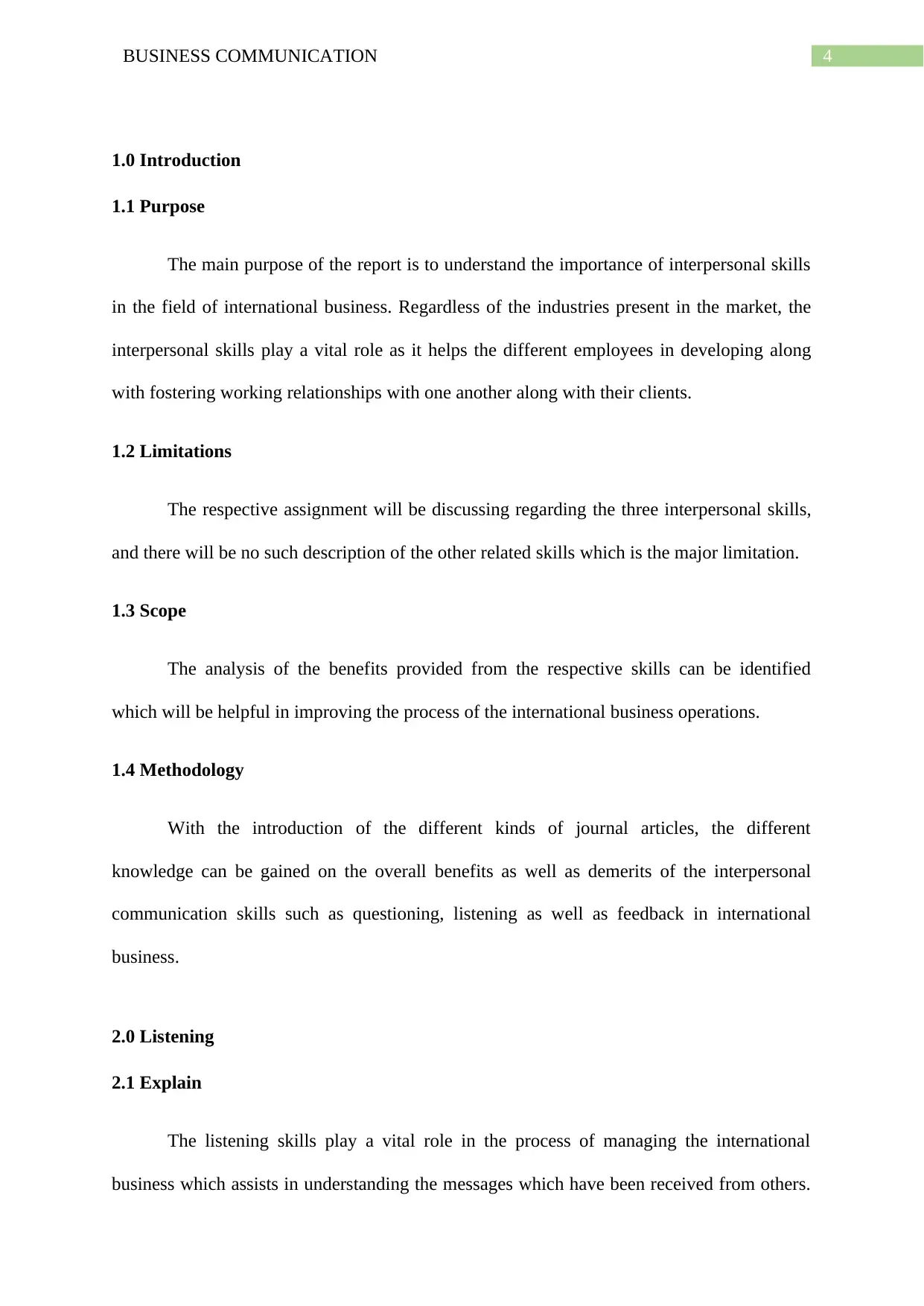
4BUSINESS COMMUNICATION
1.0 Introduction
1.1 Purpose
The main purpose of the report is to understand the importance of interpersonal skills
in the field of international business. Regardless of the industries present in the market, the
interpersonal skills play a vital role as it helps the different employees in developing along
with fostering working relationships with one another along with their clients.
1.2 Limitations
The respective assignment will be discussing regarding the three interpersonal skills,
and there will be no such description of the other related skills which is the major limitation.
1.3 Scope
The analysis of the benefits provided from the respective skills can be identified
which will be helpful in improving the process of the international business operations.
1.4 Methodology
With the introduction of the different kinds of journal articles, the different
knowledge can be gained on the overall benefits as well as demerits of the interpersonal
communication skills such as questioning, listening as well as feedback in international
business.
2.0 Listening
2.1 Explain
The listening skills play a vital role in the process of managing the international
business which assists in understanding the messages which have been received from others.
1.0 Introduction
1.1 Purpose
The main purpose of the report is to understand the importance of interpersonal skills
in the field of international business. Regardless of the industries present in the market, the
interpersonal skills play a vital role as it helps the different employees in developing along
with fostering working relationships with one another along with their clients.
1.2 Limitations
The respective assignment will be discussing regarding the three interpersonal skills,
and there will be no such description of the other related skills which is the major limitation.
1.3 Scope
The analysis of the benefits provided from the respective skills can be identified
which will be helpful in improving the process of the international business operations.
1.4 Methodology
With the introduction of the different kinds of journal articles, the different
knowledge can be gained on the overall benefits as well as demerits of the interpersonal
communication skills such as questioning, listening as well as feedback in international
business.
2.0 Listening
2.1 Explain
The listening skills play a vital role in the process of managing the international
business which assists in understanding the messages which have been received from others.
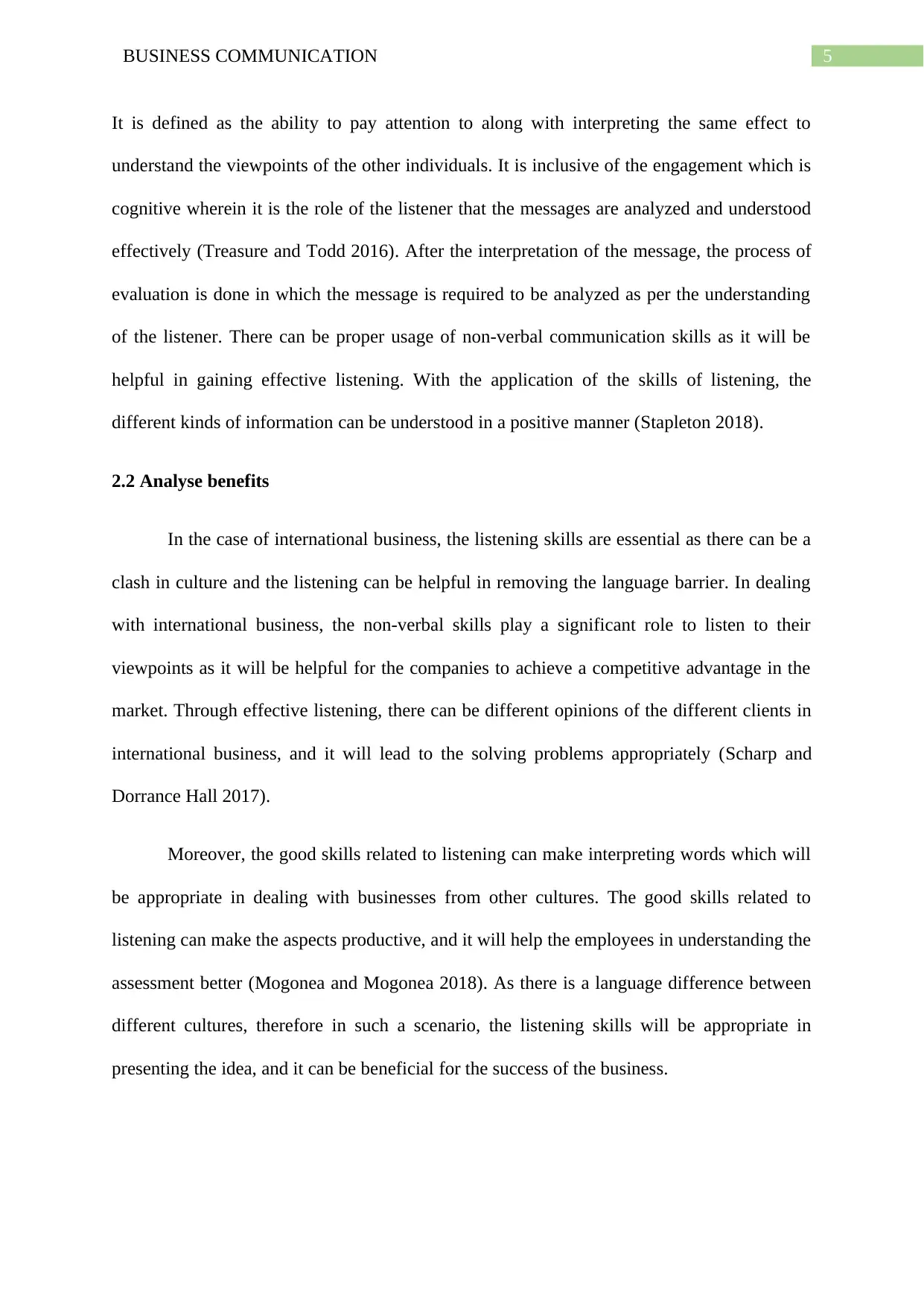
5BUSINESS COMMUNICATION
It is defined as the ability to pay attention to along with interpreting the same effect to
understand the viewpoints of the other individuals. It is inclusive of the engagement which is
cognitive wherein it is the role of the listener that the messages are analyzed and understood
effectively (Treasure and Todd 2016). After the interpretation of the message, the process of
evaluation is done in which the message is required to be analyzed as per the understanding
of the listener. There can be proper usage of non-verbal communication skills as it will be
helpful in gaining effective listening. With the application of the skills of listening, the
different kinds of information can be understood in a positive manner (Stapleton 2018).
2.2 Analyse benefits
In the case of international business, the listening skills are essential as there can be a
clash in culture and the listening can be helpful in removing the language barrier. In dealing
with international business, the non-verbal skills play a significant role to listen to their
viewpoints as it will be helpful for the companies to achieve a competitive advantage in the
market. Through effective listening, there can be different opinions of the different clients in
international business, and it will lead to the solving problems appropriately (Scharp and
Dorrance Hall 2017).
Moreover, the good skills related to listening can make interpreting words which will
be appropriate in dealing with businesses from other cultures. The good skills related to
listening can make the aspects productive, and it will help the employees in understanding the
assessment better (Mogonea and Mogonea 2018). As there is a language difference between
different cultures, therefore in such a scenario, the listening skills will be appropriate in
presenting the idea, and it can be beneficial for the success of the business.
It is defined as the ability to pay attention to along with interpreting the same effect to
understand the viewpoints of the other individuals. It is inclusive of the engagement which is
cognitive wherein it is the role of the listener that the messages are analyzed and understood
effectively (Treasure and Todd 2016). After the interpretation of the message, the process of
evaluation is done in which the message is required to be analyzed as per the understanding
of the listener. There can be proper usage of non-verbal communication skills as it will be
helpful in gaining effective listening. With the application of the skills of listening, the
different kinds of information can be understood in a positive manner (Stapleton 2018).
2.2 Analyse benefits
In the case of international business, the listening skills are essential as there can be a
clash in culture and the listening can be helpful in removing the language barrier. In dealing
with international business, the non-verbal skills play a significant role to listen to their
viewpoints as it will be helpful for the companies to achieve a competitive advantage in the
market. Through effective listening, there can be different opinions of the different clients in
international business, and it will lead to the solving problems appropriately (Scharp and
Dorrance Hall 2017).
Moreover, the good skills related to listening can make interpreting words which will
be appropriate in dealing with businesses from other cultures. The good skills related to
listening can make the aspects productive, and it will help the employees in understanding the
assessment better (Mogonea and Mogonea 2018). As there is a language difference between
different cultures, therefore in such a scenario, the listening skills will be appropriate in
presenting the idea, and it can be beneficial for the success of the business.
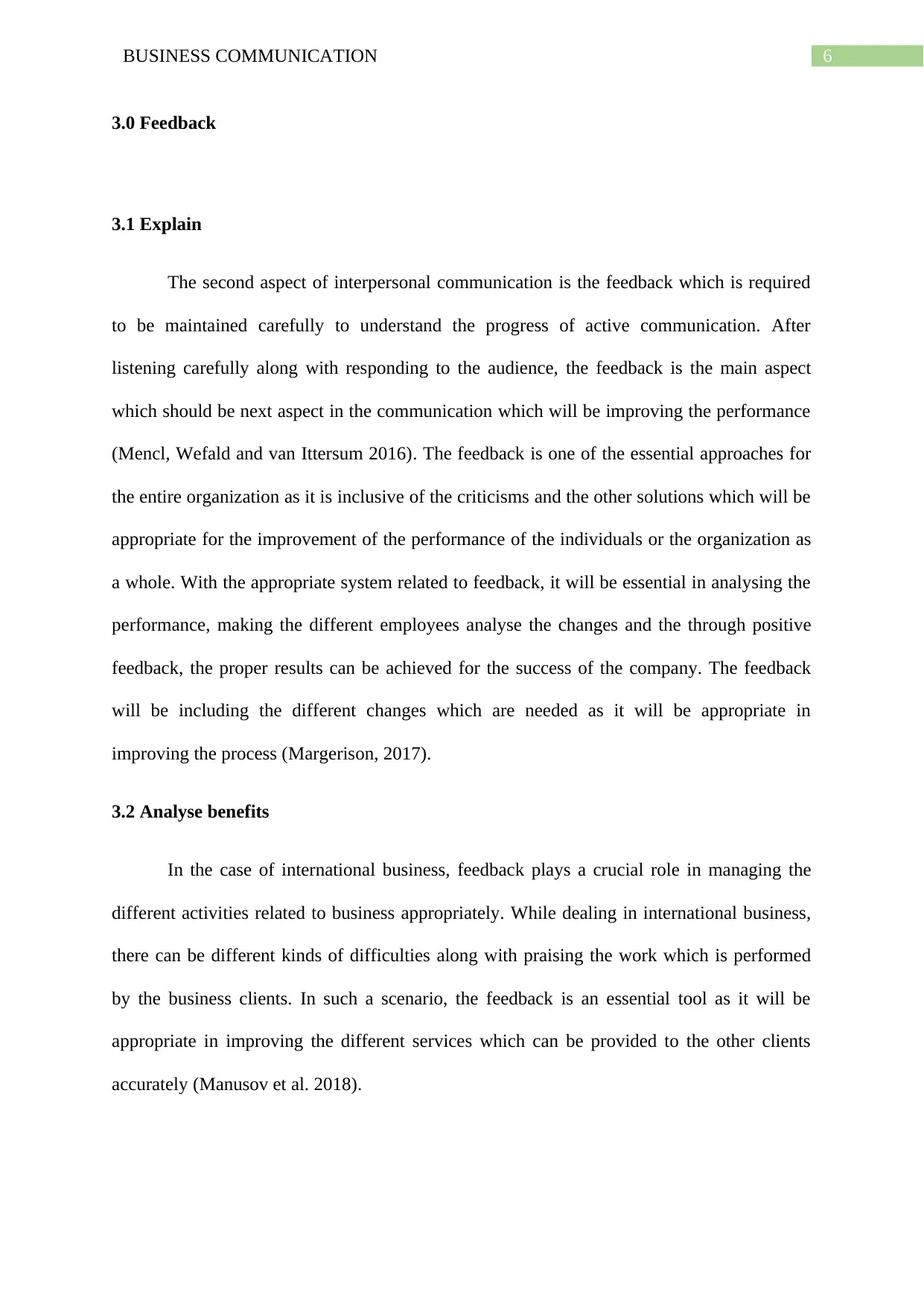
6BUSINESS COMMUNICATION
3.0 Feedback
3.1 Explain
The second aspect of interpersonal communication is the feedback which is required
to be maintained carefully to understand the progress of active communication. After
listening carefully along with responding to the audience, the feedback is the main aspect
which should be next aspect in the communication which will be improving the performance
(Mencl, Wefald and van Ittersum 2016). The feedback is one of the essential approaches for
the entire organization as it is inclusive of the criticisms and the other solutions which will be
appropriate for the improvement of the performance of the individuals or the organization as
a whole. With the appropriate system related to feedback, it will be essential in analysing the
performance, making the different employees analyse the changes and the through positive
feedback, the proper results can be achieved for the success of the company. The feedback
will be including the different changes which are needed as it will be appropriate in
improving the process (Margerison, 2017).
3.2 Analyse benefits
In the case of international business, feedback plays a crucial role in managing the
different activities related to business appropriately. While dealing in international business,
there can be different kinds of difficulties along with praising the work which is performed
by the business clients. In such a scenario, the feedback is an essential tool as it will be
appropriate in improving the different services which can be provided to the other clients
accurately (Manusov et al. 2018).
3.0 Feedback
3.1 Explain
The second aspect of interpersonal communication is the feedback which is required
to be maintained carefully to understand the progress of active communication. After
listening carefully along with responding to the audience, the feedback is the main aspect
which should be next aspect in the communication which will be improving the performance
(Mencl, Wefald and van Ittersum 2016). The feedback is one of the essential approaches for
the entire organization as it is inclusive of the criticisms and the other solutions which will be
appropriate for the improvement of the performance of the individuals or the organization as
a whole. With the appropriate system related to feedback, it will be essential in analysing the
performance, making the different employees analyse the changes and the through positive
feedback, the proper results can be achieved for the success of the company. The feedback
will be including the different changes which are needed as it will be appropriate in
improving the process (Margerison, 2017).
3.2 Analyse benefits
In the case of international business, feedback plays a crucial role in managing the
different activities related to business appropriately. While dealing in international business,
there can be different kinds of difficulties along with praising the work which is performed
by the business clients. In such a scenario, the feedback is an essential tool as it will be
appropriate in improving the different services which can be provided to the other clients
accurately (Manusov et al. 2018).
Paraphrase This Document
Need a fresh take? Get an instant paraphrase of this document with our AI Paraphraser
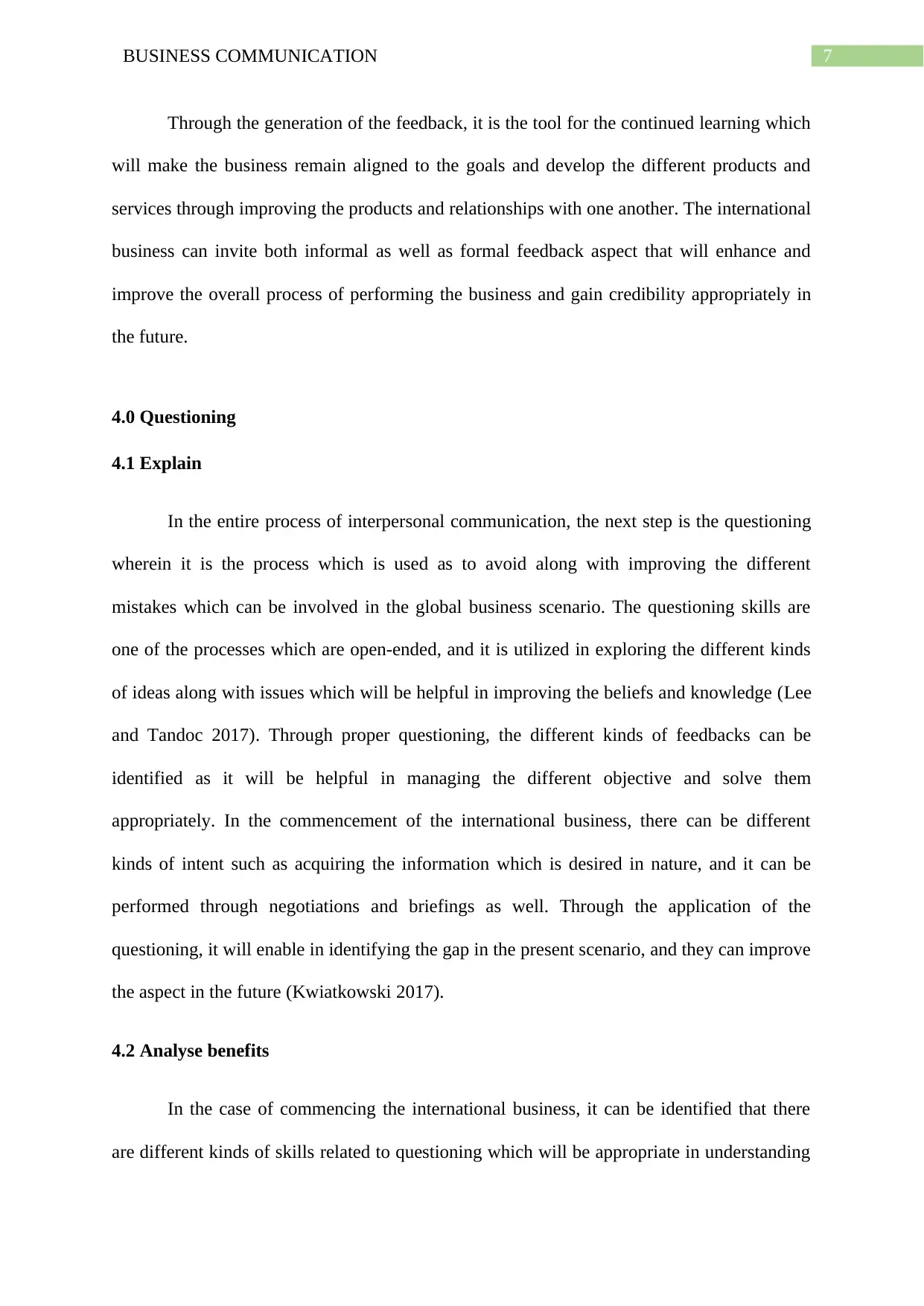
7BUSINESS COMMUNICATION
Through the generation of the feedback, it is the tool for the continued learning which
will make the business remain aligned to the goals and develop the different products and
services through improving the products and relationships with one another. The international
business can invite both informal as well as formal feedback aspect that will enhance and
improve the overall process of performing the business and gain credibility appropriately in
the future.
4.0 Questioning
4.1 Explain
In the entire process of interpersonal communication, the next step is the questioning
wherein it is the process which is used as to avoid along with improving the different
mistakes which can be involved in the global business scenario. The questioning skills are
one of the processes which are open-ended, and it is utilized in exploring the different kinds
of ideas along with issues which will be helpful in improving the beliefs and knowledge (Lee
and Tandoc 2017). Through proper questioning, the different kinds of feedbacks can be
identified as it will be helpful in managing the different objective and solve them
appropriately. In the commencement of the international business, there can be different
kinds of intent such as acquiring the information which is desired in nature, and it can be
performed through negotiations and briefings as well. Through the application of the
questioning, it will enable in identifying the gap in the present scenario, and they can improve
the aspect in the future (Kwiatkowski 2017).
4.2 Analyse benefits
In the case of commencing the international business, it can be identified that there
are different kinds of skills related to questioning which will be appropriate in understanding
Through the generation of the feedback, it is the tool for the continued learning which
will make the business remain aligned to the goals and develop the different products and
services through improving the products and relationships with one another. The international
business can invite both informal as well as formal feedback aspect that will enhance and
improve the overall process of performing the business and gain credibility appropriately in
the future.
4.0 Questioning
4.1 Explain
In the entire process of interpersonal communication, the next step is the questioning
wherein it is the process which is used as to avoid along with improving the different
mistakes which can be involved in the global business scenario. The questioning skills are
one of the processes which are open-ended, and it is utilized in exploring the different kinds
of ideas along with issues which will be helpful in improving the beliefs and knowledge (Lee
and Tandoc 2017). Through proper questioning, the different kinds of feedbacks can be
identified as it will be helpful in managing the different objective and solve them
appropriately. In the commencement of the international business, there can be different
kinds of intent such as acquiring the information which is desired in nature, and it can be
performed through negotiations and briefings as well. Through the application of the
questioning, it will enable in identifying the gap in the present scenario, and they can improve
the aspect in the future (Kwiatkowski 2017).
4.2 Analyse benefits
In the case of commencing the international business, it can be identified that there
are different kinds of skills related to questioning which will be appropriate in understanding
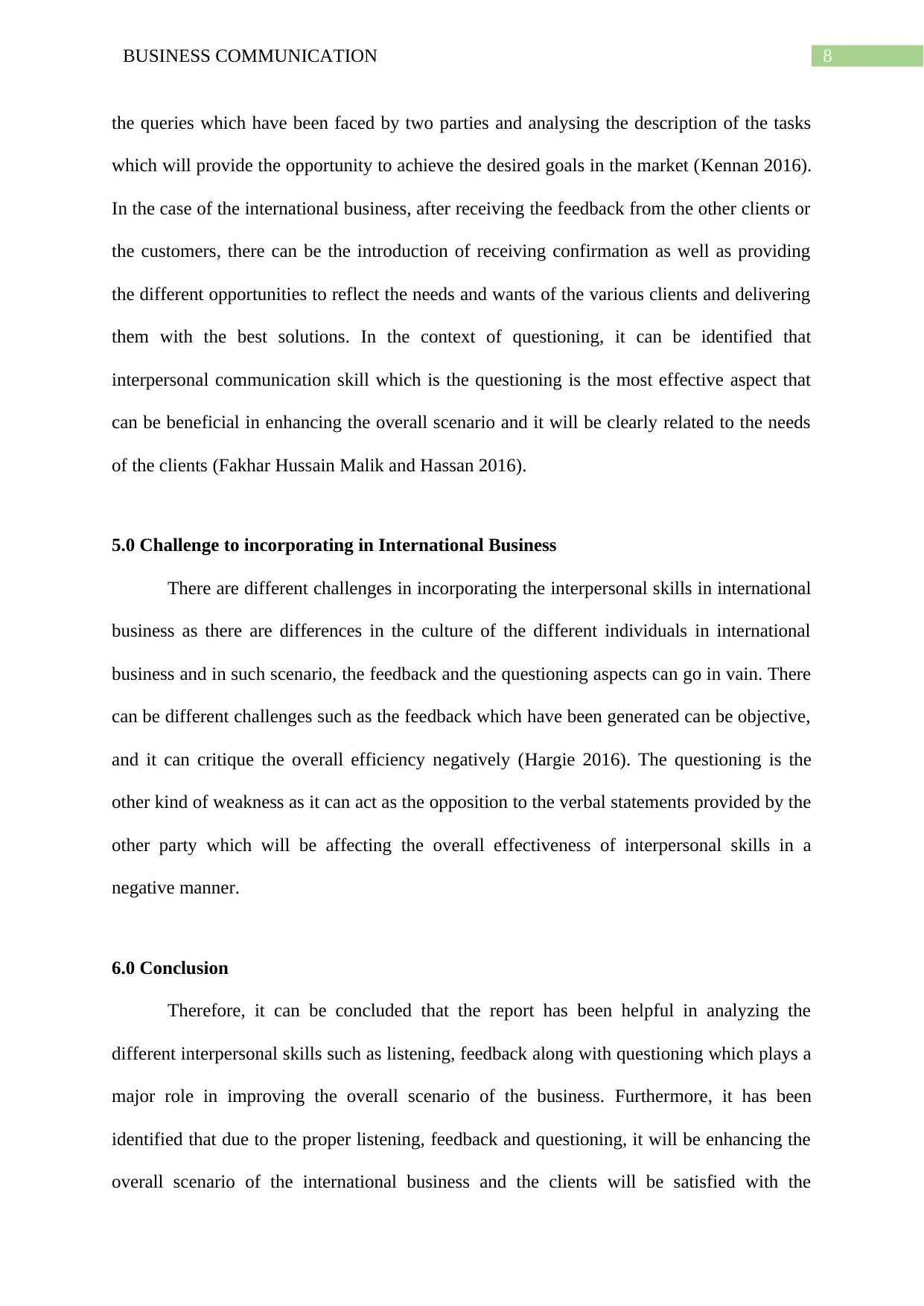
8BUSINESS COMMUNICATION
the queries which have been faced by two parties and analysing the description of the tasks
which will provide the opportunity to achieve the desired goals in the market (Kennan 2016).
In the case of the international business, after receiving the feedback from the other clients or
the customers, there can be the introduction of receiving confirmation as well as providing
the different opportunities to reflect the needs and wants of the various clients and delivering
them with the best solutions. In the context of questioning, it can be identified that
interpersonal communication skill which is the questioning is the most effective aspect that
can be beneficial in enhancing the overall scenario and it will be clearly related to the needs
of the clients (Fakhar Hussain Malik and Hassan 2016).
5.0 Challenge to incorporating in International Business
There are different challenges in incorporating the interpersonal skills in international
business as there are differences in the culture of the different individuals in international
business and in such scenario, the feedback and the questioning aspects can go in vain. There
can be different challenges such as the feedback which have been generated can be objective,
and it can critique the overall efficiency negatively (Hargie 2016). The questioning is the
other kind of weakness as it can act as the opposition to the verbal statements provided by the
other party which will be affecting the overall effectiveness of interpersonal skills in a
negative manner.
6.0 Conclusion
Therefore, it can be concluded that the report has been helpful in analyzing the
different interpersonal skills such as listening, feedback along with questioning which plays a
major role in improving the overall scenario of the business. Furthermore, it has been
identified that due to the proper listening, feedback and questioning, it will be enhancing the
overall scenario of the international business and the clients will be satisfied with the
the queries which have been faced by two parties and analysing the description of the tasks
which will provide the opportunity to achieve the desired goals in the market (Kennan 2016).
In the case of the international business, after receiving the feedback from the other clients or
the customers, there can be the introduction of receiving confirmation as well as providing
the different opportunities to reflect the needs and wants of the various clients and delivering
them with the best solutions. In the context of questioning, it can be identified that
interpersonal communication skill which is the questioning is the most effective aspect that
can be beneficial in enhancing the overall scenario and it will be clearly related to the needs
of the clients (Fakhar Hussain Malik and Hassan 2016).
5.0 Challenge to incorporating in International Business
There are different challenges in incorporating the interpersonal skills in international
business as there are differences in the culture of the different individuals in international
business and in such scenario, the feedback and the questioning aspects can go in vain. There
can be different challenges such as the feedback which have been generated can be objective,
and it can critique the overall efficiency negatively (Hargie 2016). The questioning is the
other kind of weakness as it can act as the opposition to the verbal statements provided by the
other party which will be affecting the overall effectiveness of interpersonal skills in a
negative manner.
6.0 Conclusion
Therefore, it can be concluded that the report has been helpful in analyzing the
different interpersonal skills such as listening, feedback along with questioning which plays a
major role in improving the overall scenario of the business. Furthermore, it has been
identified that due to the proper listening, feedback and questioning, it will be enhancing the
overall scenario of the international business and the clients will be satisfied with the
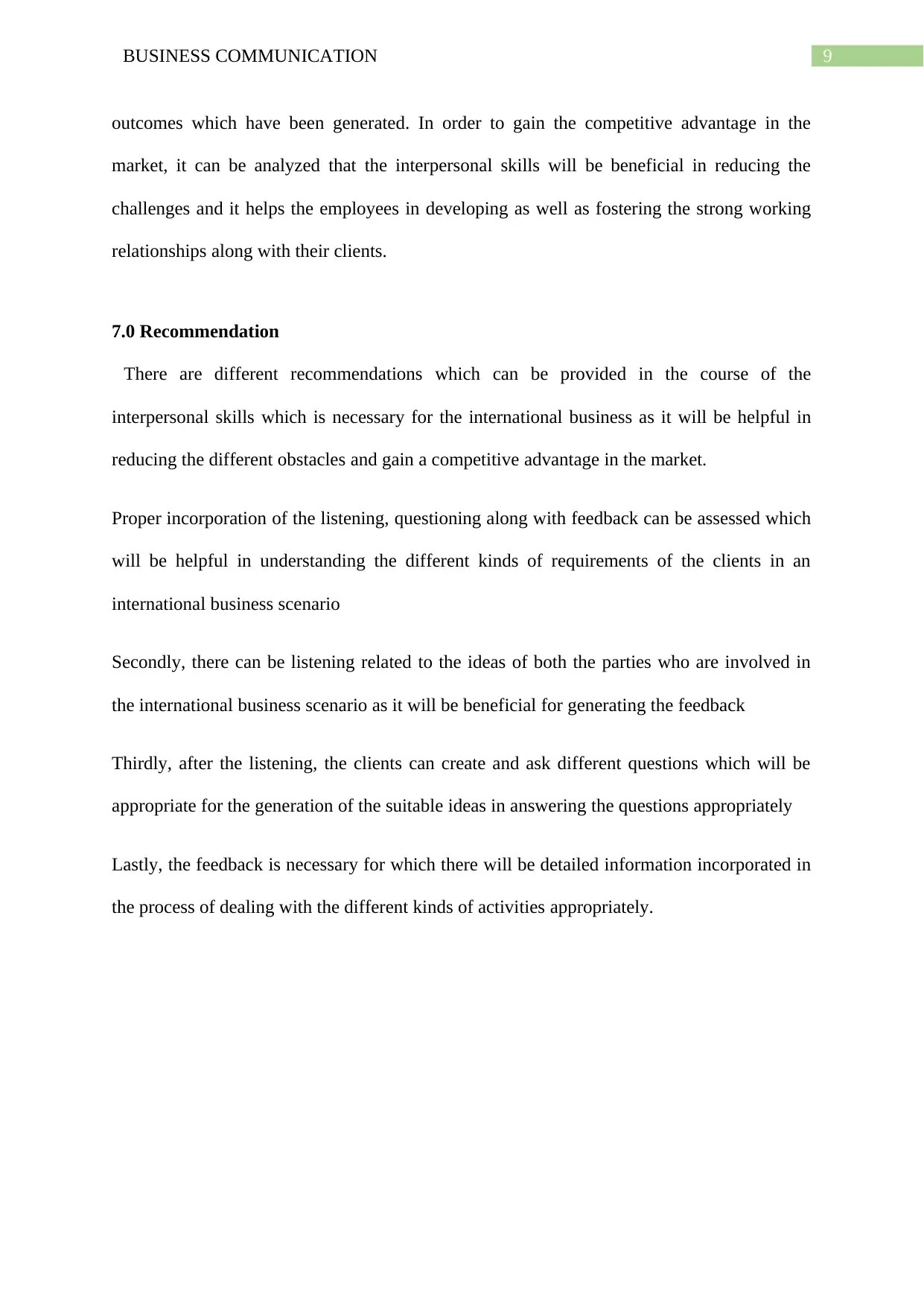
9BUSINESS COMMUNICATION
outcomes which have been generated. In order to gain the competitive advantage in the
market, it can be analyzed that the interpersonal skills will be beneficial in reducing the
challenges and it helps the employees in developing as well as fostering the strong working
relationships along with their clients.
7.0 Recommendation
There are different recommendations which can be provided in the course of the
interpersonal skills which is necessary for the international business as it will be helpful in
reducing the different obstacles and gain a competitive advantage in the market.
Proper incorporation of the listening, questioning along with feedback can be assessed which
will be helpful in understanding the different kinds of requirements of the clients in an
international business scenario
Secondly, there can be listening related to the ideas of both the parties who are involved in
the international business scenario as it will be beneficial for generating the feedback
Thirdly, after the listening, the clients can create and ask different questions which will be
appropriate for the generation of the suitable ideas in answering the questions appropriately
Lastly, the feedback is necessary for which there will be detailed information incorporated in
the process of dealing with the different kinds of activities appropriately.
outcomes which have been generated. In order to gain the competitive advantage in the
market, it can be analyzed that the interpersonal skills will be beneficial in reducing the
challenges and it helps the employees in developing as well as fostering the strong working
relationships along with their clients.
7.0 Recommendation
There are different recommendations which can be provided in the course of the
interpersonal skills which is necessary for the international business as it will be helpful in
reducing the different obstacles and gain a competitive advantage in the market.
Proper incorporation of the listening, questioning along with feedback can be assessed which
will be helpful in understanding the different kinds of requirements of the clients in an
international business scenario
Secondly, there can be listening related to the ideas of both the parties who are involved in
the international business scenario as it will be beneficial for generating the feedback
Thirdly, after the listening, the clients can create and ask different questions which will be
appropriate for the generation of the suitable ideas in answering the questions appropriately
Lastly, the feedback is necessary for which there will be detailed information incorporated in
the process of dealing with the different kinds of activities appropriately.
Secure Best Marks with AI Grader
Need help grading? Try our AI Grader for instant feedback on your assignments.
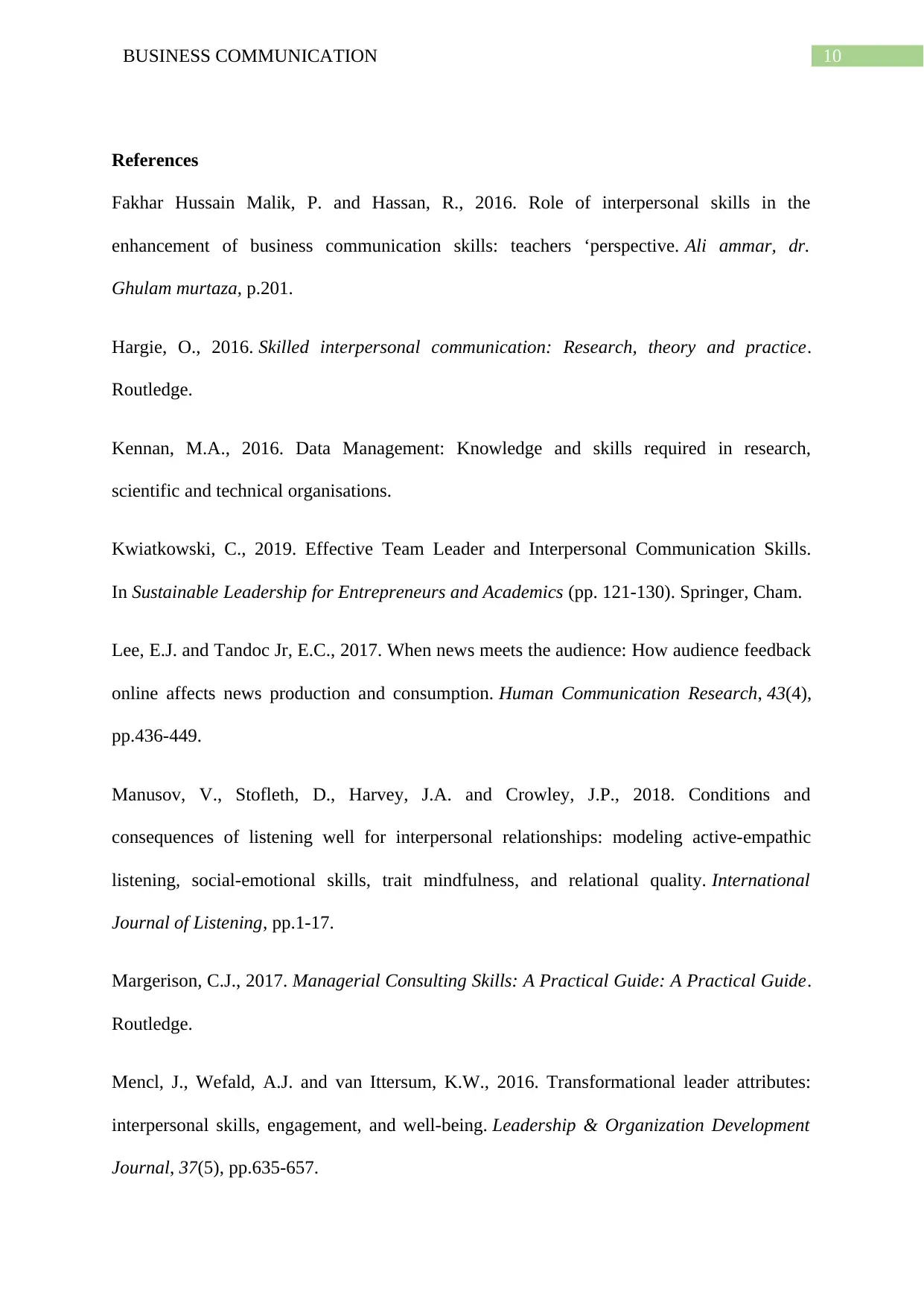
10BUSINESS COMMUNICATION
References
Fakhar Hussain Malik, P. and Hassan, R., 2016. Role of interpersonal skills in the
enhancement of business communication skills: teachers ‘perspective. Ali ammar, dr.
Ghulam murtaza, p.201.
Hargie, O., 2016. Skilled interpersonal communication: Research, theory and practice.
Routledge.
Kennan, M.A., 2016. Data Management: Knowledge and skills required in research,
scientific and technical organisations.
Kwiatkowski, C., 2019. Effective Team Leader and Interpersonal Communication Skills.
In Sustainable Leadership for Entrepreneurs and Academics (pp. 121-130). Springer, Cham.
Lee, E.J. and Tandoc Jr, E.C., 2017. When news meets the audience: How audience feedback
online affects news production and consumption. Human Communication Research, 43(4),
pp.436-449.
Manusov, V., Stofleth, D., Harvey, J.A. and Crowley, J.P., 2018. Conditions and
consequences of listening well for interpersonal relationships: modeling active-empathic
listening, social-emotional skills, trait mindfulness, and relational quality. International
Journal of Listening, pp.1-17.
Margerison, C.J., 2017. Managerial Consulting Skills: A Practical Guide: A Practical Guide.
Routledge.
Mencl, J., Wefald, A.J. and van Ittersum, K.W., 2016. Transformational leader attributes:
interpersonal skills, engagement, and well-being. Leadership & Organization Development
Journal, 37(5), pp.635-657.
References
Fakhar Hussain Malik, P. and Hassan, R., 2016. Role of interpersonal skills in the
enhancement of business communication skills: teachers ‘perspective. Ali ammar, dr.
Ghulam murtaza, p.201.
Hargie, O., 2016. Skilled interpersonal communication: Research, theory and practice.
Routledge.
Kennan, M.A., 2016. Data Management: Knowledge and skills required in research,
scientific and technical organisations.
Kwiatkowski, C., 2019. Effective Team Leader and Interpersonal Communication Skills.
In Sustainable Leadership for Entrepreneurs and Academics (pp. 121-130). Springer, Cham.
Lee, E.J. and Tandoc Jr, E.C., 2017. When news meets the audience: How audience feedback
online affects news production and consumption. Human Communication Research, 43(4),
pp.436-449.
Manusov, V., Stofleth, D., Harvey, J.A. and Crowley, J.P., 2018. Conditions and
consequences of listening well for interpersonal relationships: modeling active-empathic
listening, social-emotional skills, trait mindfulness, and relational quality. International
Journal of Listening, pp.1-17.
Margerison, C.J., 2017. Managerial Consulting Skills: A Practical Guide: A Practical Guide.
Routledge.
Mencl, J., Wefald, A.J. and van Ittersum, K.W., 2016. Transformational leader attributes:
interpersonal skills, engagement, and well-being. Leadership & Organization Development
Journal, 37(5), pp.635-657.
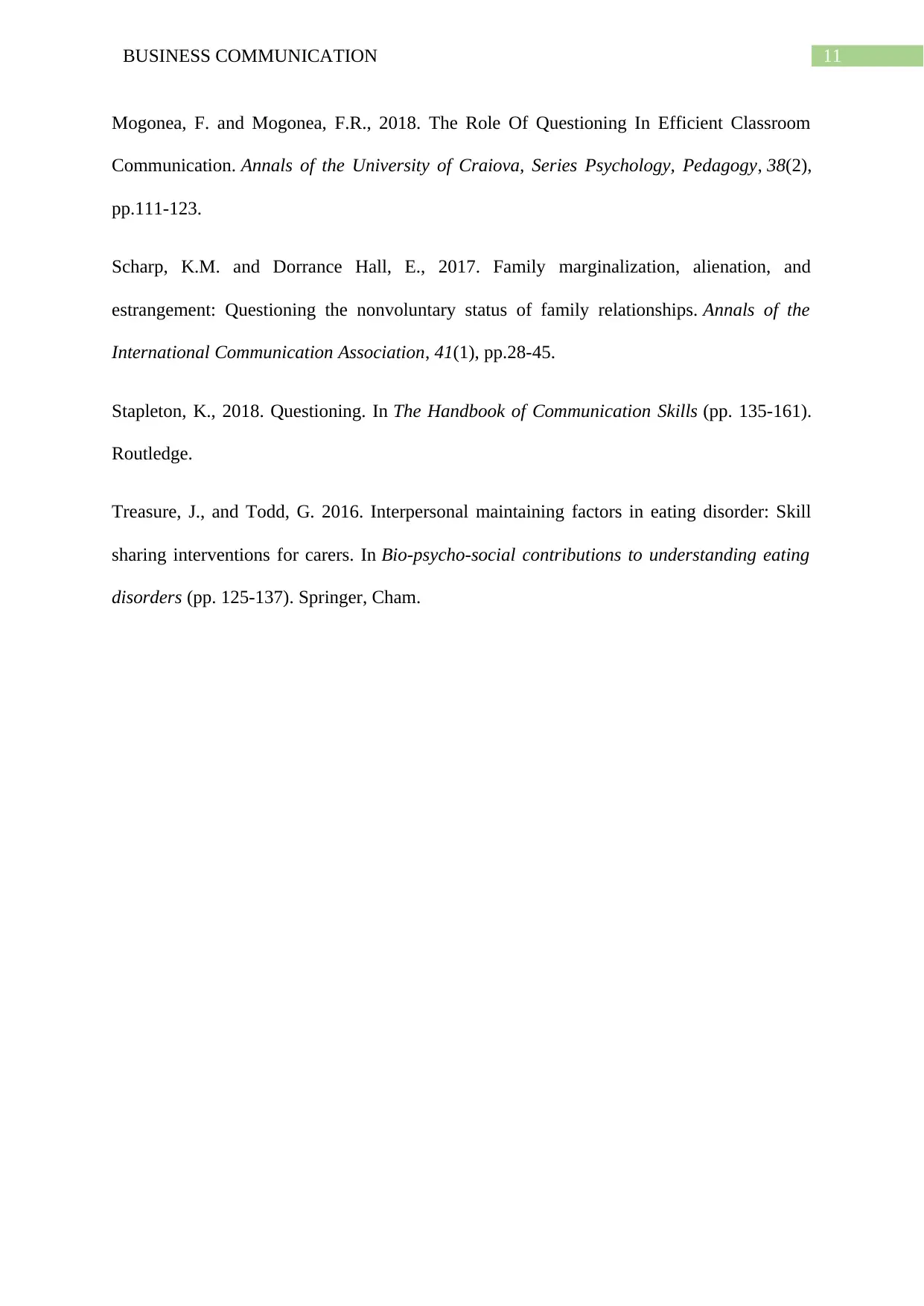
11BUSINESS COMMUNICATION
Mogonea, F. and Mogonea, F.R., 2018. The Role Of Questioning In Efficient Classroom
Communication. Annals of the University of Craiova, Series Psychology, Pedagogy, 38(2),
pp.111-123.
Scharp, K.M. and Dorrance Hall, E., 2017. Family marginalization, alienation, and
estrangement: Questioning the nonvoluntary status of family relationships. Annals of the
International Communication Association, 41(1), pp.28-45.
Stapleton, K., 2018. Questioning. In The Handbook of Communication Skills (pp. 135-161).
Routledge.
Treasure, J., and Todd, G. 2016. Interpersonal maintaining factors in eating disorder: Skill
sharing interventions for carers. In Bio-psycho-social contributions to understanding eating
disorders (pp. 125-137). Springer, Cham.
Mogonea, F. and Mogonea, F.R., 2018. The Role Of Questioning In Efficient Classroom
Communication. Annals of the University of Craiova, Series Psychology, Pedagogy, 38(2),
pp.111-123.
Scharp, K.M. and Dorrance Hall, E., 2017. Family marginalization, alienation, and
estrangement: Questioning the nonvoluntary status of family relationships. Annals of the
International Communication Association, 41(1), pp.28-45.
Stapleton, K., 2018. Questioning. In The Handbook of Communication Skills (pp. 135-161).
Routledge.
Treasure, J., and Todd, G. 2016. Interpersonal maintaining factors in eating disorder: Skill
sharing interventions for carers. In Bio-psycho-social contributions to understanding eating
disorders (pp. 125-137). Springer, Cham.
1 out of 12
Related Documents
Your All-in-One AI-Powered Toolkit for Academic Success.
+13062052269
info@desklib.com
Available 24*7 on WhatsApp / Email
![[object Object]](/_next/static/media/star-bottom.7253800d.svg)
Unlock your academic potential
© 2024 | Zucol Services PVT LTD | All rights reserved.





